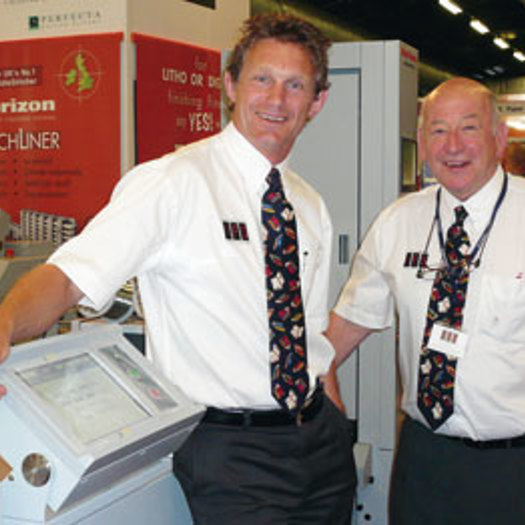Known as a forthright business leader, a shrewd negotiator, and, occasionally, a controversial character, former Agfa UK chief Laurence Roberts was with the Belgium-based graphics group for 19 years. In this exclusive interview, he gives his take on print – its successes and failures, past, present and future – from a unique standpoint.
If you hadn’t been in printing what would you have liked to do?
Before I moved into printing, I was in telecoms. That’s an interesting, fast-moving business too and I would probably have stayed in that. I didn’t consciously decide to move into printing – I was offered a job and I took it. And I was quite surprised at how people in print thought you couldn’t possibly be in this business unless you’d done a trade apprenticeship, been a compositor, and run a printing press. At the time, a number of people said it was unusual that I’d come from a different industry into print.
You started off in the Copyproof era and now all the talk is about inkjet. What are your thoughts about the rate at which new technology is replacing the revenues and profits of the old?
I’m not a great subscriber to the idea that it is all going to be digital in five years’ time. I think that’s complete rubbish. There is too much emphasis on how much we’re supposedly going to lose from conventional operators due to the growth of digital. I think we will gain an awful lot in digital, but an awful lot of that will be complementary. And that’s certainly reflected in Agfa’s numbers. The doom and gloom that people propagate is completely over-done.
You should know the picture because you were still selling rather a lot of printing plates to commercial printers, weren’t you?
The UK market this year will be somewhere between 24.5-25 million square metres of plates. That’s a dying business, is it? It doesn’t look particularly dying to me. It’s a huge volume of business. And some people seem to think that’s all going to disappear in five years’ time. I don’t think people who write that sort of thing have any idea how big the market is. There’s no sign of that suddenly becoming 20 million square metres in the next two years. Agfa will still make money on printing plates for a few more years to come. Do you know we sold 90 million square metres of film last year? And I sold £5m worth in the UK. It’s an amazing amount – the tail is long and we’re the last man standing in film. And there’ll be a long tail for plates too. That’s one thing with digital print: it won’t just be substitution, it will add to the volume. I’m certain of that. Conventional print will go down slightly, but not cataclysmically.
Obviously, Agfa targets the higher end of the market.
I always tell my sales people, don’t pitch for business without checking people out. Have these people got any money? Go and find out if they’ve got some money first. If they have, go and talk to them. If they haven’t, don’t waste your time. I only want to do business with people whose business is run properly. And that means that they’re charging the correct amount of money to their customers so they can afford to pay me. I don’t want to deal at the low end, and I think that’s very important.
What do you think separates a good printing company from a bad one?
A good printing company knows the value of what it’s offering and charges for it. And the people who are not so good, or who get their work by bidding the lowest prices on auction, are going to fail. Because there’s always going to be someone, somewhere, who’s cheaper. You have to decide in life, are you in this for the long haul? If you are, you’d better jolly well get your service offering right, and convince your customers what they should pay for and make them pay for it. If you don’t convince yourself that what you’re doing is worth the money, you’ll never get it. You’ve got to say "This is what we do, and we’re good at this, and it costs X". You’ve got to be clear about what you’re offering and what differentiates you. I don’t think everybody thinks like that. I don’t think people sit down and think "how can I make myself, in the eyes of the customer, not a commodity".
What do you think is the one single thing printing companies could do better?
One thing we at Agfa are quite good at is holding our price. We have huge rows with people, as you know. Printers, could do with dealing less with their friends, and regard it like I do – this is just business. In other words, I have no friends. It’s just money. And I think that is a very good view of business life. As opposed to "I’ll do this or that for you". I don’t think printers quite value what they do enough. There are exceptions, of course. But if everything’s on price or online auctions, it’s just ludicrous from my point of view. If you’re entering into an auction, you’re not valuing yourself. Once that’s your life, it’s very hard to get out of it. So why go into the gutter in the first place?
There’s an unwillingness among people to stand their ground as aggressively as they ought to do, because they’re so petrified of losing the volume.
I have been prepared to walk away from business, and I have done. I don’t think printers have a mindset to do that sort of thing. They tell you why they can’t do it, and I say, but have you ever tried? You’ll find it’s quite cathartic, really. Otherwise, where does it go? You’re going nowhere and all you’ve got to look forward to is another five or 10 years of remorseless slog.
You’re in print to make money, aren’t you? That’s my biggest negative observation.
We hear that one of the last things you were working on for Agfa was a five-year plan. Can you share some insights on your thoughts for the future of the industry?
At Drupa 2012, you’ll see an awful lot more digital equipment that will be deliverable, unlike some of the things we saw at Ipex. I believe that at a big exhibition like Ipex you need to show something that works and that you can take orders for. You can show people technology in a different environment to that of a big trade show. Some of the products we saw at Ipex reminded me of the Manroland Dicoweb. Interesting machines, but oh my god the price! They’re joking, they can’t be serious.
By Drupa it will be "actually you can have one of these in spring 2013" and we’ll see a lot more digital products coming to the market in 2013, 2014, and 2015. By 2015 I don’t think it will be hugely different from where we are now, but there will be more digital. By the time we get to 2020, I don’t think you’ll have newspapers and book printing with the same kind of dominant print technology as we do now. But who knows what the technology will bring? People are putting so much money into inkjet, both the heads and ink. Look at us with the M-Press. Look at the quality now compared to what it was four years ago.
Nowadays you wouldn’t know that it wasn’t printed litho. It’s incredible. And that’s in four years. So you imagine the money being invested by everybody in the next 10 years and I’m sure we’ll see quite a change. I’m sure technology will improve greatly. The great thing about new technology is that today you can contact TJ International, or CPI, and ask them to do just one book. That would have been inconceivable a few years ago, and now it can be done. It makes available things that weren’t available from a litho point of view.
What’s your biggest regret?
My biggest regret is that, all of that technology, of computer-to-plate – all that technological advance and the corporate ability to reduce the amount of people involved in the process – all the advantage went to the publishers and not to the printers. What printers did is they gave away all that extra margin to their customers, as opposed to keeping, say, 20% of it for themselves. Printers now are probably less profitable than in the days of camera film and early imagesetters.
What will you miss most about the printing industry?
I shall miss the cut and thrust of the business, of doing deals and also the camaraderie. And I’ll miss some of the people, of course. And I will miss the buzz. One or two people in the industry I shall continue to see, the vast majority of people I’ve spent my time arguing with, well, I doubt if I will come across them. And that’s the way things should be.
And what will you miss least?
The thing I will miss the least is the time that I had to spend working. I am really, really, really looking forward to having more time. It’s not so much the pressure of the commercial activity, it’s the time spent at work that has got more intrusive. It’s quite nice to be able to say ‘I can do what I like today’. And I’ve got some plans. For example, I’m going to do some work for The Children’s Trust at Tadworth.
What kept you awake at night?
Nothing kept me awake at night. I was always too tired.
Lastly, we must know the answer to this: what’s your favourite thing about Belgium?
Antwerp is a very nice place. And the Belgian people are, individually, very pleasant people.
CLASSIC ROBERTS
Disaster for digital debut - the press that really did fall off the back of a lorry: In 1994, we imported the first ever Chromapress. Joe Brim at Laserbureau was the customer. I got a call. "Laurence, we’ve got a bit of a problem with this Chromapress". What’s the matter? "It’s sort of fallen off the lorry…" The driver had parked outside the Laserbureau building in London’s West End. He’d removed the fixings keeping the press secured and was inside the factory talking about how they would bring it into the building. And in the meantime the thing had slipped down the tailgate and was lying on its side in the gutter. And it was the only one in the world, and this was the beta site. That wasn’t a great phone call I had to make. We just had to pick it up out of the gutter and send it back to Belgium. I can laugh about it now, but at the time it was the end of the world.
Advice to a fellow supplier on dealing with a particularly challenging mutual customer: "You’re too nice, too educated and you don’t know enough English swear words to be able to deal with those people."
Additional shipment: We shipped a whole load of film in a hurry once and when the customer opened the trailer three illegal immigrants jumped out. The customer asked me whether we were going to charge him for the three Albanians. I explained that we don’t do Albanians, but I invoiced him for them anyway.










